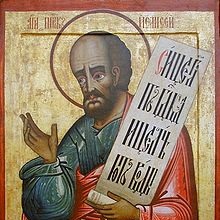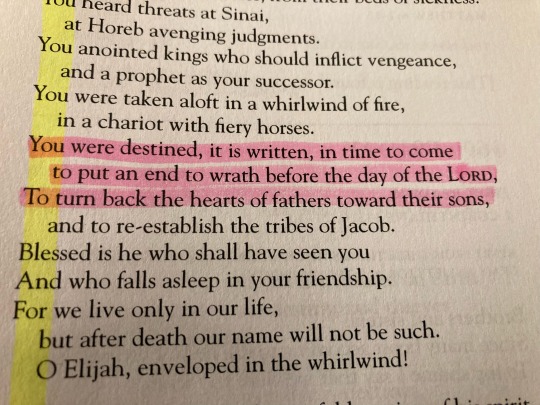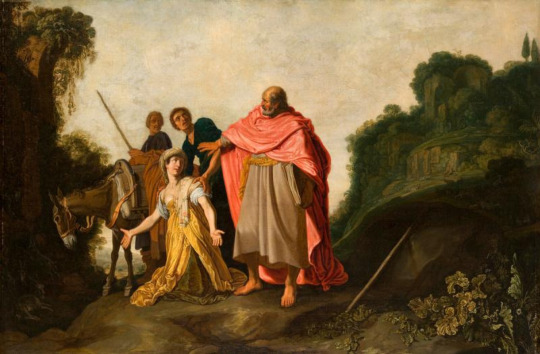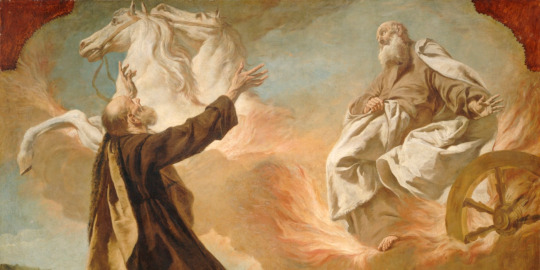#the prophet elisha
Text
Jesus’ wonders, [according to Luke 11:19-20,] are not only a valid but an essential stamp of God’s approval on His mission. Unbiased spectators saw this clearly, even as the religious authorities offered compelling theological arguments against the Nazarene’s claim: “Yet many in the crowd believed in Him and were saying, ‘When the Messiah comes, will he do more signs than this man has done?” (John 7:31). [In any case,] for the disciples, all of this must have happened awfully fast. Before His teaching began in earnest with the Sermon on the Mount, before they even got to know Him at all, with hardly a word of explanation from the man Himself, the future apostles watched dozens and dozens of signs and wonders take place at the Nazarene’s command: they brought to Him all the sick, those who were afflicted with various diseases and pains, demoniacs, epileptics, and paralytics, and He cured them”(Matt. 4:24); whenever the unclean spirits saw Him, they fell down before him and shouted, “You are the Son of God!” (Mark 3:11); and they brought to Him all who were sick or possessed with demons. And the whole city was gathered around the door (Mark 1:32-33).
It is important to realize that these early chapters of the four Gospels contain a truly unprecedented outpouring of the miraculous. Many who haven't yet studied the Bible carefully harbor an impression that Scripture is [packed] with signs and wonders— a miracle on practically every page. This isn’t the case at all. During certain phases of Israel’s history, centuries go by with scarcely a whiff of the supernatural. Even when Moses began to lead the people, “there had been no appearance of Jehovah to any one for above four hundred years, and they might well think that the age of miracles was past,” according to the great Anglican scholar Charles Ellicott. “Miracles cluster around certain crises in God’s dealings with man... often “ceasing altogether between one crisis and another.” In fact, the whole 500 years before Christ’s great Galilee ministry began— since the days when Daniel had been delivered from the lion’s den— had been one of these dry periods.
If we distinguish between miracles worked by God at his own initiative and those “called down” in some manner by a human wonder-worker— an audible plea, for instance, or the use of some sacramental medium such as Moses’ rod of power or the salt with which Elisha healed the poisonous waters of Jericho— then miracles of the type worked by Jesus are rare indeed in the Old Testament. Moses performed twelve or fifteen, depending on how many of the Egyptian plagues we reckon were commenced at his word (and at least one of those was performed by his brother Aaron using Moses’ rod). Joshua worked about four such miracles during his career, and Elijah and Elisha about twelve cach. Jesus of Nazareth, on the other hand, may well have performed twelve an hour some days. Nearly forty, at any rate, are individually described in the Gospels, but the actual total is impossible to calculate. They came in such a flood that large numbers of them are often lumped together in indefinite masses, as Luke relates: "He came down with them and stood on a level place, with a great crowd of His disciples and a great multitude of people from all Judea, Jerusalem, and the coast of Tyre and Sidon. They had come to hear Him and to be healed of their diseases ... And all in the crowd were trying to touch Him, for power came out from Him and healed all of them" (Luke 6:19). This is but one of fifteen or so similar passages.
So when our Lord did finally begin to teach His disciples, we may be sure that He had their full attention. In their eyes, He was no longer auditioning for the part; they had ceased comparing Him to the Baptist or, indeed, to any other prophet. The eruption of miracles had simply blown all quibbles away. They still entertained, to be sure, half a dozen contradictory ideas about the role He had come to play, but now they considered the puzzle from a new position: sitting at his feet figuratively— and then often literally— speaking.
Rod Bennett
#rod bennett#this shines a whole new light on it#i did not know this#miracles#jesus christ#reflect on this#Jesus is the christ#old testament#Moses#the prophet elisha#the prophet elijah#aaron#joshua#this is a vital distinction
4 notes
·
View notes
Text
BALD GUY FIGHT MEGA TOURNAMENT ROUND 1


See all mega tournament polls here
Reasoning under cut
Elisha the Prophet
Funniest part of the bible fr so: Once some guys were mocking Elisha for being bald so he cursed them and then bears came out of the woods and mauled the guys to death (2 Kings 2:23-24)
because it’d be funny
Lady Cassandra
One big ol slab of face on skin. MOISTERISE ME
#bald guy fight mega tournament#bgfmt round 1#elisha the prophet#the bible#lady cassandra#doctor who#polls
83 notes
·
View notes
Video
youtube
Elisha- Prophet of God (animated movie)
Rich Animation Studios | Runtime: 25mins 50secs
16 notes
·
View notes
Text

Sirach 48:10b
Let us pray for all those in fractured relationship with their parents over their sexuality and gender this Pride month.
May those prodigal parents who reject their children come to see the light of Christ’s love and return their hearts rightfully.
Be merciful, O Lord.
#Catholic#catholicism#sirach#Bible#sacred scripture#prodigal son#the prodigal son#Elijah#prophet Elijah#Elisha#gay catholic#lgbtq catholic#lgbtq+ catholic
31 notes
·
View notes
Text

There are three types of prophets…
#cant win them all#cynicism#doomsday prophets#elijah the prophet#elisha the prophet#john the baptist#artists on tumblr#pencil sketch#my draws#bible#god#jesus humor#repent#kingdomofgod#humor#funny#humour#comedy#meme
4 notes
·
View notes
Photo

Today we celebrate the memory of the Holy Prophet Elisha. Prophet Elisha was a disciple of Prophet Elijah and when the latter ascended to heaven, Prophet Elisha asked for double the blessing that Prophet Elijah would receive in Heaven. He was promised this and Elijah let down his clock, leaving it to Elisha. This was the start of his prophetic service. Through his prayers, Elisha divided the Jordan River, just like Moses and the Red Sea, he turned a salty, undrinkable spring into sweet, as well as many other miracles. May the Holy Prophet intercede for us all + #saint #prophet #elisha #elijah #prophetelijah #prophetelisha #miracle #partingoftheredsea #partingofthejordan #jordan #river #jordanriver #prophetic #prophecy #orthodox #saintoftheday (at Samaria) https://www.instagram.com/p/Cexe8IDv0G-/?igshid=NGJjMDIxMWI=
#saint#prophet#elisha#elijah#prophetelijah#prophetelisha#miracle#partingoftheredsea#partingofthejordan#jordan#river#jordanriver#prophetic#prophecy#orthodox#saintoftheday
12 notes
·
View notes
Text
i am auto-resurrecting. i am creeping along the floorboards and giving the parts of myself i previously killed mouth-to-mouth. the bible never condemns a good self-eventing death cult
3 notes
·
View notes
Text

#buffy the vampire slayer#sarah#sarah michelle gellar#1 kings 19:16#elisha prophet in thy room#daily bread#nightly bread#god is love#bible
1 note
·
View note
Photo

MECHANICS OF THE SPIRIT -- a Bill's Bible Basics series This #BillsBibleBasics 3-part series by #BillKochman can be read at: https://www.billkochman.com/Articles/mechanics-of-the-spirit-01.html https://www.billkochman.com/Blog/index.php/mechanics-of-the-spirit-a-bills-bible-basics-series/?feed_id=142164&MECHANICS%20OF%20THE%20SPIRIT%20--%20a%20Bill%27s%20Bible%20Basics%20series
#All_Posts#New_Articles#anointed#anointing#comforter#day_of_pentecost#earthen_vessels#elijah#elisha#holy_ghost#holy_spirit#jesus#john_the_baptist#joshua#mechanics#mechanics_of_the_spirit#moses#prophet#spirit#treasure
0 notes
Text
Elisha

#very much a bit character - just needed a name to mention#and now that i'm staring at it i just realized it's spelled the same as the prophet elisha#but it's supposed to be like alicia - maybe i should change the spelling? ^^'#captain america#whole shards#take me in#elisha
0 notes
Text
A Divine Appointment (2 Kings 8:1-6)
In order to allow the good to completely fill us, we must be totally emptied of everything else.
The prophet Elisha and the Shunammite woman, by Pieter Lastman, 1620
Elisha spoke to the woman whose son he had brought back to life: “You and your household must go away and live wherever you can, because the Lord has called for a famine. It is coming to the land and will last seven years.”
So the woman went and did what the man of God asked. She and her household moved away, living in…

View On WordPress
#2 kings#2 kings 8#adversity#blessing#divine appointment#divine sovereignty#god&039;s authority#god&039;s help#god&039;s mercy#god&039;s power#god&039;s presence#hard circumstances#prophet elisha#second kings#shunammite woman#sovereign god#spiritual life
0 notes
Text
How striking is the contrast between the translation of Elijah and the Ascension of Christ! He who ascended up where He was before needed no whirlwind, nor chariot of fire, nor extraneous power to elevate Him to His home. Calmly, slowly, as borne upwards by indwelling affinity with heaven, He floated thither with outstretched hands of blessing. The servant angels did not need to surround Him, but, clad no longer in fiery armour, but ‘in white apparel,’ the emblem of purity and peace, they stood by the disciples and comforted them with hope. Elijah was carried to heaven. Christ went. The angels disappeared with the prophet and left Elisha to grieve alone. They lingered here after Christ had gone, and turned tears into rainbows flashing with the hues of hope.
Alexander MacLaren
#alexander maclaren#the ascension#jesus christ#the translation of Elijah#this is so beautiful#angels#the prophet elijah#the prophet elisha
2 notes
·
View notes
Video
youtube
Elijah’s Rapture and Elisha’s Promotion (2 Kings 2) - A Bible study from...
0 notes
Video
youtube
(via TRACKING THE SEASON WITH CALIBRATED PROPHETIC GPS. PART 3.)
#Prophetic season#Understanding spiritual transition#Elisha's transition#Kingdom life principle#Kingdom empowering#Kingdom-life devotional#Faith#God's word#This present truth#Isaiah 50:4
0 notes
Photo

THE DESCRIPTION OF SAINT ELISHA THE PROPHET
The Successor of of the Prophet Elijah
Feast Day: June 14
"Let me inherit a double portion of your spirit." -2 Kings 2:9
A Carmelite and a prophet.
Elisha was a prophet in the northern kingdom of Israel in the 800s BC. His moment of calling was rather mystical: Elisha was plowing a field with twelve yoke of oxen when his predecessor, Elijah, came along and placed his mantle over Elisha's shoulders―a symbol of a call to share in prophetic work. Elisha requested time to say farewell to his parents and then slew the oxen, gave the meat to the people, and joined Elijah.
Chapters 2 to 9 in 2 Kings hold the bulk of the many extraordinary stories surrounding Elisha. After a miraculous crossing of the Jordan River, Elisha watched in amazement as Elijah was suddenly taken to heaven on a fiery chariot. Elisha then took Elijah's cloak and repeated the miracle Elijah had just displayed of striking the cloak upon the water, causing the river to split open.
Also included in these chapters are many other mystical accounts that demonstrate how powerfully the spirit of God was with Elisha: he cleansed bad waters in Jericho, miraculously provided water to Israelite soldiers suffering from dire thirst, inexplicably procured oil for a poor widow, purified poisoned stew, squelched attacks, predicted future events, and more.
One of Elisha's more popular marvels involves a military commander from the kingdom of Aram named Naaman. Naaman suffered from leprosy and heard of Elisha's powers. The commander went to the prophet and was stunned that Elisha told him to wash seven times in the Jordan River, for Naaman felt that other rivers had purer waters. Reluctantly, after some urging from his servants, the commander did as he was told and was completely healed.
Astonishingly, yet another miraculous event surrounding Elisha occurred shortly after his death. A man had died, and while his friends were burying him, they noticed a raiding band heading their way. They quickly tossed the man’s dead body into the grave of Elisha, whereupon the man promptly returned to life.
The Carmelite Order, mindful of its origin on Mount Carmel, with the liturgical celebration of the great Prophets Elijah and Elisha, intends to perpetuate the memory of their presence and of their works. This is why in the year 1399, the Carmelite General Chapter decreed the celebration of the feast of Saint Elisha. In our time, the Prophet gives effective witness of the prophetic charism by means of fidelity to the true God and the service to his people.
Source: National Catholic Register and Province of St. Titus Brandsma of the Philippines (carmelitesph.org)
1 note
·
View note
Text
"A certain critic—for such men, I regret to say, do exist—made the nasty remark about my last novel that it contained 'all the old Wodehouse characters under different names.' He has probably now been eaten by bears, like the children who made mock of the prophet Elisha: but if he still survives he will not be able to make a similar charge against Summer Lightning. With my superior intelligence, I have outgeneralled this man by putting in all the old Wodehouse characters under the same names. Pretty silly it will make him feel, I rather fancy."

(P. G. Wodehouse, via Wodehouse Tweets (@inimitablepgw) at Twitter)
3K notes
·
View notes